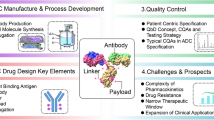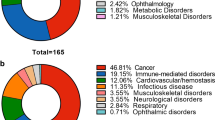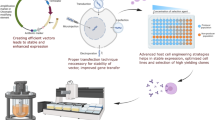Abstract
Rapid and efficient bispecific antibody (BsAb) production for industrial applications is still facing many challenges. We reported a technology platform for generating bispecific IgG antibodies, “Bispecific Antibody by Protein Trans-splicing (BAPTS).” While the “BAPTS” method has shown potential in high-throughput screening of BsAbs, further understanding and optimizing the methodology is desirable. A large number of BsAbs were selected to illustrate the conversion efficiency and kinetics parameters. The temperature of reaction makes no significant influence in conversion efficiency, which can reach more than 70% within 2 h, and CD3 × HER2 BsAb can reach 90%. By fitting trans-splicing reaction to single-component exponential decay curves, the apparent first-order rate constants at a series of temperatures were determined. The rate constant ranges from 0.02 to 0.11 min−1 at 37 °C, which is a high rate reported for the protein trans-splicing reaction (PTS). The reaction process is activated rapidly with activation energy of 8.9 kcal·mol−1 (CD3 × HER2) and 5.2 kcal·mol−1 (CD3 × EGFR). The BsAbs generated by “BAPTS” technology not only had the similar post-translation modifications to the parental antibodies, but also demonstrated excellent in vitro and in vivo bioactivity. The kinetics parameters and activation energy of the reaction illustrate feasible for high-throughput screening and industrial applications using the “BAPTS” approach.
Key points
• The trans-splicing reaction of Npu DnaE intein in “BAPTS” platform is a rapid process with low reaction activation and high rate.
• The BsAb generated by “BAPTS” remained effective in tumor cell killing.
• The kinetics parameters and activation energy of the reaction illustrate feasible for high-throughput screening and industrial applications using the “BAPTS” approach.






Similar content being viewed by others
Data availability
The data presented in this study are available upon request to the corresponding author. The data may be not publicly available due to their use in further studies.
References
Ayoub D, Jabs W, Resemann A, Evers W, Evans C, Main L, Baessmann C, Wagner-Rousset E, Suckau D, Beck A (2013) Correct primary structure assessment and extensive glyco-profiling of cetuximab by a combination of intact, middle-up, middle-down and bottom-up ESI and MALDI mass spectrometry techniques. Mabs 5(5):699–710. https://doi.org/10.4161/mabs.25423
Camarero JA, Fushman D, Sato S, Giriat I, Cowburn D, Raleigh DP, Muir TW (2001) Rescuing a destabilized protein fold through backbone cyclization. J Mol Biol 308(5):1045–1062. https://doi.org/10.1006/jmbi.2001.4631
Carter P (2001) Bispecific human IgG by design. J Immunol Methods 248(1):7–15. https://doi.org/10.1016/S0022-1759(00)00339-2
Chen J, Pan Z, Han L, Zhou Y, Zong H, Wang L, Sun R, Jiang H, Xie Y, Yuan Y, Wu M, Bian Y, Zhang B, Zhu J (2021) A novel bispecific antibody targeting CD3 and Lewis Y with potent therapeutic efficacy against gastric cancer. Biomedicines 9(8):1059. https://doi.org/10.3390/biomedicines9081059
Cheriyan M, Pedamallu CS, Tori K, Perler F (2013) Faster protein splicing with the Nostoc punctiforme DnaE intein using non-native extein residues. J Biol Chem 288(9):6202–6211. https://doi.org/10.1074/jbc.M112.433094
Deschuyteneer G, Garcia S, Michiels B, Baudoux B, Degand H, Morsomme P, Soumillion P (2010) Intein-mediated cyclization of randomized peptides in the periplasm of Escherichia coli and their extracellular secretion. ACS Chem Biol 5(7):691–700. https://doi.org/10.1021/cb100072u
Ding K, Han L, Zong H, Chen J, Zhang B, Zhu J (2017) Production process reproducibility and product quality consistency of transient gene expression in HEK293 cells with anti-PD1 antibody as the model protein. Appl Microbiol Biotechnol 101(5):1889–1898. https://doi.org/10.1007/s00253-016-7973-y
Dwek RA (1998) Biological importance of glycosylation. In: Coleman AW (ed) Molecular recognition and inclusion. Springer, Dordrecht, pp 1–6
Han L, Chen J, Ding K, Zong H, Xie Y, Jiang H, Zhang B, Lu H, Yin W, Gilly J, Zhu J (2017) Efficient generation of bispecific IgG antibodies by split intein mediated protein trans-splicing system. Sci Rep 7(1):8360. https://doi.org/10.1038/s41598-017-08641-3
Han L, Zong H, Zhou Y, Pan Z, Chen J, Ding K, Xie Y, Jiang H, Zhang B, Lu H, Gilly J, Zhu J (2019) Naturally split intein Npu DnaE mediated rapid generation of bispecific IgG antibodies. Methods 154:32–37. https://doi.org/10.1016/j.ymeth.2018.10.001
Hawe A, Poole R, Romeijn S, Kasper P, van der Heijden R, Jiskoot W (2009) Towards heat-stable oxytocin formulations: analysis of degradation kinetics and identification of degradation products. Pharm Res 26(7):1679–1688. https://doi.org/10.1007/s11095-009-9878-2
Hofmann T, Krah S, Sellmann C, Zielonka S, Doerner A (2020a) Greatest hits-innovative technologies for high throughput identification of bispecific antibodies. Int J Mol Sci 21(18) doi: https://doi.org/10.3390/ijms21186551
Hofmann T, Schmidt J, Ciesielski E, Becker S, Rysiok T, Schütte M, Toleikis L, Kolmar H, Doerner A (2020b) Intein mediated high throughput screening for bispecific antibodies. Mabs 12(1):1731938. https://doi.org/10.1080/19420862.2020.1731938
Iwai H, Zuger S, Jin J, Tam PH (2006) Highly efficient protein trans-splicing by a naturally split DnaE intein from Nostoc punctiforme. FEBS Lett 580(7):1853–1858. https://doi.org/10.1016/j.febslet.2006.02.045
Jager M, Schoberth A, Ruf P, Hess J, Lindhofer H (2009) The trifunctional antibody ertumaxomab destroys tumor cells that express low levels of human epidermal growth factor receptor 2. Cancer Res 69(10):4270–4276. https://doi.org/10.1158/0008-5472.can-08-2861
Junttila TT, Li J, Johnston J, Hristopoulos M, Clark R, Ellerman D, Wang BE, Li Y, Mathieu M, Li G, Young J, Luis E, Lewis Phillips G, Stefanich E, Spiess C, Polson A, Irving B, Scheer JM, Junttila MR, Dennis MS, Kelley R, Totpal K, Ebens A (2014) Antitumor efficacy of a bispecific antibody that targets HER2 and activates T cells. Cancer Res 74(19):5561–5571. https://doi.org/10.1158/0008-5472.CAN-13-3622-T
Labrijn AF, Meesters JI, de Goeij BE, van den Bremer ET, Neijssen J, van Kampen MD, Strumane K, Verploegen S, Kundu A, Gramer MJ, van Berkel PH, van de Winkel JG, Schuurman J, Parren PW (2013) Efficient generation of stable bispecific IgG1 by controlled Fab-arm exchange. Proc Natl Acad Sci U S A 110(13):5145–5150. https://doi.org/10.1073/pnas.1220145110
Liang R, Zhou J, Liu J (2011) Construction of a bacterial assay for estrogen detection based on an estrogen-sensitive intein. Appl Environ Microbiol 77(7):2488–2495. https://doi.org/10.1128/aem.02336-10
Martin DD, Xu M-Q, Evans TC (2001) Characterization of a naturally occurring trans-splicing intein from Synechocystis sp. PCC6803. Biochemistry 40(5):1393–1402 doi: https://doi.org/10.1021/bi001786g
Nanda A, Nasker SS, Mehra A, Panda S, Nayak S (2020) Inteins in science: evolution to application. Microorganisms 8(12):2004. https://doi.org/10.3390/microorganisms8122004
Ozawa T, Kaihara A, Sato M, Tachihara K, Umezawa Y (2001) Split luciferase as an optical probe for detecting protein-protein interactions in mammalian cells based on protein splicing. Anal Chem 73(11):2516–2521. https://doi.org/10.1021/ac0013296
Pan Z, Chen J, Xiao X, Xie Y, Jiang H, Zhang B, Lu H, Yuan Y, Han L, Zhou Y, Zong H, Wang L, Sun R, Zhu J (2021) Characterization of a novel bispecific antibody targeting tissue factor-positive tumors with T cell engagement. Acta Pharmaceutica Sinica B. https://doi.org/10.1016/j.apsb.2021.10.028
Pavankumar TL (2018) Inteins: localized distribution, gene regulation, and protein engineering for biological applications. Microorganisms 6(1) doi: https://doi.org/10.3390/microorganisms6010019
Rouet R, Christ D (2014) Bispecific antibodies with native chain structure. Nat Biotechnol 32(2):136–137. https://doi.org/10.1038/nbt.2812
Sarmiento C, Camarero JA (2019) Biotechnological applications of protein splicing. Curr Protein Pept Sci 20(5):408–424. https://doi.org/10.2174/1389203720666190208110416
Shah NH, Muir TW (2014) Inteins: nature’s gift to protein chemists. Chem Sci 5(1):446–461. https://doi.org/10.1039/c3sc52951g
Shatz W, Chung S, Li B, Marshall B, Tejada M, Phung W, Sandoval W, Kelley RF, Scheer JM (2013) Knobs-into-holes antibody production in mammalian cell lines reveals that asymmetric afucosylation is sufficient for full antibody-dependent cellular cytotoxicity. Mabs 5(6):872–881. https://doi.org/10.4161/mabs.26307
Shi S, Chen H, Jiang H, Xie Y, Zhang L, Li N, Zhu C, Chen J, Luo H, Wang J, Feng L, Lu H, Zhu J (2017) A novel self-cleavable tag Zbasic-I-CM and its application in the soluble expression of recombinant human interleukin-15 in Escherichia coli. Appl Microbiol Biotechnol 101(3):1133–1142. https://doi.org/10.1007/s00253-016-7848-2
Spiess C, Merchant M, Huang A, Zheng Z, Yang NY, Peng J, Ellerman D, Shatz W, Reilly D, Yansura DG, Scheer JM (2013) Bispecific antibodies with natural architecture produced by co-culture of bacteria expressing two distinct half-antibodies. Nat Biotechnol 31(8):753–758. https://doi.org/10.1038/nbt.2621
Strop P, Ho WH, Boustany LM, Abdiche YN, Lindquist KC, Farias SE, Rickert M, Appah CT, Pascua E, Radcliffe T, Sutton J, Chaparro-Riggers J, Chen W, Casas MG, Chin SM, Wong OK, Liu SH, Vergara G, Shelton D, Rajpal A, Pons J (2012) Generating bispecific human IgG1 and IgG2 antibodies from any antibody pair. J Mol Biol 420(3):204–219. https://doi.org/10.1016/j.jmb.2012.04.020
Sun R, Zhou Y, Han L, Pan Z, Chen J, Zong H, Bian Y, Jiang H, Zhang B, Zhu J (2021) A rational designed novel bispecific antibody for the treatment of GBM. Biomedicines 9(6) doi: https://doi.org/10.3390/biomedicines9060640
Topilina NI, Mills KV (2014) Recent advances in in vivo applications of intein-mediated protein splicing. Mob DNA 5(1):5. https://doi.org/10.1186/1759-8753-5-5
Vila-Perelló M, Muir TW (2010) Biological applications of protein splicing. Cell 143(2):191–200. https://doi.org/10.1016/j.cell.2010.09.031
Wang J, Han L, Chen J, Xie Y, Jiang H, Zhu J (2019) Reduction of non-specific toxicity of immunotoxin by intein mediated reconstitution on target cells. Int Immunopharmacol 66:288–295. https://doi.org/10.1016/j.intimp.2018.11.039
Wu H, Hu Z, Liu XQ (1998) Protein trans-splicing by a split intein encoded in a split DnaE gene of Synechocystis sp. PCC6803. Proc Natl Acad Sci U S A 95(16):9226–31. https://doi.org/10.1073/pnas.95.16.9226
Xu Y, Zhang L, Ma B, Hu L, Lu H, Dou T, Chen J, Zhu J (2018) Intermolecular disulfide bonds between unpaired cysteines retard the C-terminal trans-cleavage of Npu DnaE. Enzyme Microb Technol 118:6–12. https://doi.org/10.1016/j.enzmictec.2018.06.013
Zettler J, Schutz V, Mootz HD (2009) The naturally split Npu DnaE intein exhibits an extraordinarily high rate in the protein trans-splicing reaction. FEBS Lett 583(5):909–914. https://doi.org/10.1016/j.febslet.2009.02.003
Zhou Y, Zong H, Han L, Xie Y, Jiang H, Gilly J, Zhang B, Lu H, Chen J, Sun R, Pan Z, Zhu J (2020) A novel bispecific antibody targeting CD3 and prolactin receptor (PRLR) against PRLR-expression breast cancer. J Exp Clin Cancer Res 39(1):87. https://doi.org/10.1186/s13046-020-01564-4
Zhu J (2013) Update on production of recombinant therapeutic protein: transient gene expression, Smithers Rapra Technology, Shropshire
Zuger S, Iwai H (2005) Intein-based biosynthetic incorporation of unlabeled protein tags into isotopically labeled proteins for NMR studies. Nat Biotechnol 23(6):736–740. https://doi.org/10.1038/nbt1097
Funding
This work was financially supported by the Jecho Laboratories, Inc. This work has been supported by a grant to Jianwei Zhu from Natural Science Foundation # 81773621 and # 82073751.
Author information
Authors and Affiliations
Contributions
Conceptualization: J.Z., B.Z., and L.H.
Experiments and sample preparation: majority performed by H.Z., with contributions by L.H., J.C., Z.P., L.W., and R.S.
Writing – original draft preparation: L.H. and H.Z.
Data analysis: H.Z.
Writing – review and editing: all authors.
All authors had read and agreed to the published version of the manuscript.
Corresponding authors
Ethics declarations
Ethics approval
Informed consent was obtained from all participants donating blood.
Competing interests
Y.X., H.J., and J.Z. are employees of Jecho Laboratories Inc. L.H., H.J., and J.Z. are employees of Jecho Biopharmaceuticals Inc. J.G. is a paid consultant to Jecho Biopharmaceuticals, Ltd.
Additional information
Publisher's note
Springer Nature remains neutral with regard to jurisdictional claims in published maps and institutional affiliations.
Supplementary Information
Below is the link to the electronic supplementary material.
Rights and permissions
About this article
Cite this article
Zong, H., Han, L., Chen, J. et al. Kinetics study of the natural split Npu DnaE intein in the generation of bispecific IgG antibodies. Appl Microbiol Biotechnol 106, 161–171 (2022). https://doi.org/10.1007/s00253-021-11707-y
Received:
Revised:
Accepted:
Published:
Issue Date:
DOI: https://doi.org/10.1007/s00253-021-11707-y




